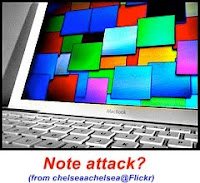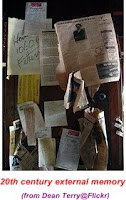
I thought I would not complete it this time. I have started late and was late all the time, more or less two weeks behind schedule (and I still am, more than two weeks behind now). Somehow, however, I managed to go through all 22 of the Things and I suppose I feel professionally developed, at least a bit more than before summer. As in the previous year, I am very grateful to the cpd23 team for organising the programme and proud of myself that I undertook it and finished it, perhaps not on time but I did it. Well, almost. Just these final thoughts are left to be blogged about (they were thought through already, just a question of dressing them up with the right words).
This year's programme was based on a different idea from last year's. There were fewer new THINGS to discover (less revelations), more to think about and reflect on - a good exercise for professional development, preparing a portfolio etc. All the advice on CV writing, applying for a job and attending the job interview will definitely be very useful in the future. Even though I had got a job before those THINGS (21 and 22) came up in the programme, nevertheless good advice is always greatly appreciated and may become handy in the future.
However there were also some more practical THINGS in the programme which I have already made use of, or may in future apply for professional or private purposes. One of them is definitely the Dropbox - a great tool for team working but also when one works on the same document from different locations, much better than the Google Docs. The others - iGoogle, Google Calendar, TeuxDeux, Doodle are just a few that I will continue to use. The most wonderful thing about THINGS like Dropbox is that they are "floating in the air" and are available from everywhere through various electronic devices, not necessarily a computer. One day when I am sipping an exotic cocktail somewhere in the far tropics I will be able to pop into my Google Calendar, check/add notes in EverNote, amend my collection in the LibraryThing and all this will not disappear (like paper notes often do) when I come back home. Just dreaming... about tropics that is.
It is time to end the REVELATION chapter in my journey through the e-world. The POST-REVELATION era will be rather Blog- and Twitter-free (at least on a personal level), but it should be more open to searching for and perhaps to applying new online gadgets and useful applications. A big THANK YOU again to the organisers of 23- and cpd23 Things and GOOD BYE!
This year's programme was based on a different idea from last year's. There were fewer new THINGS to discover (less revelations), more to think about and reflect on - a good exercise for professional development, preparing a portfolio etc. All the advice on CV writing, applying for a job and attending the job interview will definitely be very useful in the future. Even though I had got a job before those THINGS (21 and 22) came up in the programme, nevertheless good advice is always greatly appreciated and may become handy in the future.
However there were also some more practical THINGS in the programme which I have already made use of, or may in future apply for professional or private purposes. One of them is definitely the Dropbox - a great tool for team working but also when one works on the same document from different locations, much better than the Google Docs. The others - iGoogle, Google Calendar, TeuxDeux, Doodle are just a few that I will continue to use. The most wonderful thing about THINGS like Dropbox is that they are "floating in the air" and are available from everywhere through various electronic devices, not necessarily a computer. One day when I am sipping an exotic cocktail somewhere in the far tropics I will be able to pop into my Google Calendar, check/add notes in EverNote, amend my collection in the LibraryThing and all this will not disappear (like paper notes often do) when I come back home. Just dreaming... about tropics that is.
It is time to end the REVELATION chapter in my journey through the e-world. The POST-REVELATION era will be rather Blog- and Twitter-free (at least on a personal level), but it should be more open to searching for and perhaps to applying new online gadgets and useful applications. A big THANK YOU again to the organisers of 23- and cpd23 Things and GOOD BYE!















































